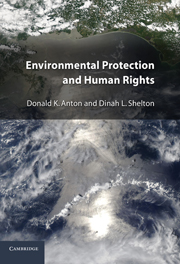Book contents
- Frontmatter
- Contents
- Acknowledgments
- Abbreviations
- Table of Cases
- 1 Law and the Environment
- 2 The Environment as a Human Rights Issue
- 3 An Introduction to Human Rights Origins and Theory
- 4 The International Protection of Human Rights
- 5 International Human Rights Institutions and Procedures
- 6 Procedural Human Rights and the Environment
- 7 Substantive Human Rights and the Environment
- 8 Indigenous Peoples, Rights, and the Environment
- 9 Humanitarian Crises: Armed Conflicts and Other Disasters
- 10 Environmental Rights and International Finance: The World Bank Example
- 11 Human Rights, the Environment, and Corporate Accountability
- Index
3 - An Introduction to Human Rights Origins and Theory
Published online by Cambridge University Press: 05 June 2012
- Frontmatter
- Contents
- Acknowledgments
- Abbreviations
- Table of Cases
- 1 Law and the Environment
- 2 The Environment as a Human Rights Issue
- 3 An Introduction to Human Rights Origins and Theory
- 4 The International Protection of Human Rights
- 5 International Human Rights Institutions and Procedures
- 6 Procedural Human Rights and the Environment
- 7 Substantive Human Rights and the Environment
- 8 Indigenous Peoples, Rights, and the Environment
- 9 Humanitarian Crises: Armed Conflicts and Other Disasters
- 10 Environmental Rights and International Finance: The World Bank Example
- 11 Human Rights, the Environment, and Corporate Accountability
- Index
Summary
The Development of Human Rights
To appreciate the role of human rights in the cause of environmental protection, it is essential to understand the historical development and debates over human rights. The following readings highlight the essential features of human rights to prepare the way for more detailed consideration in subsequent chapters of how they relate to the environment.
Introduction
Historical Foundations of Human Rights and Subsequent Developments, in 1 THE INTERNATIONAL DIMENSIONS OF HUMAN RIGHTS 11–16 (Karel Vasak ed., 1982) (footnotes omitted)
For some authors, the origins of human rights go back to Greek antiquity[; for some, even further]. They consider that human rights should come under natural law. The classic example, taken from Greek literature, is that of Antigone: according to Sophocles, when Creon reproaches Antigone for having buried her brother despite her having been forbidden to do so, Antigone replies that she has acted in accordance with the unwritten and unchanging laws of heaven. In philosophy the general tendency is to view the problem of human rights – or more precisely that of man's natural rights (and it is to be noted that equating the one with the other obscures the problem at the level of theory) – in terms of the doctrine of stoicism.
It is more difficult to seek the origins of human rights in Roman law, although an attempt has been made to discover in Cicero's work certain ideas relating to this subject.
- Type
- Chapter
- Information
- Environmental Protection and Human Rights , pp. 151 - 223Publisher: Cambridge University PressPrint publication year: 2011

